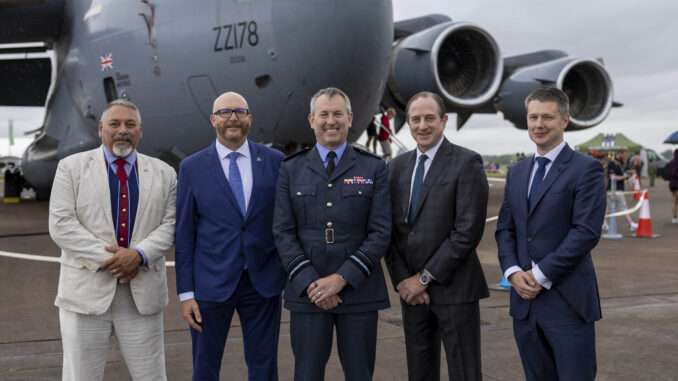
“No Technical Objection” clears way for Sustainable Aviation Fuel (SAF) use at approved blending limits on Boeing-built military aircraft
Boeing has released guidance to defense customers that company-built military aircraft can operate on sustainable aviation fuel (SAF) at currently approved limits of up to 50% blend with conventional fuel. The guidance, announced at RIAT, aims to support global militaries who are evaluating the adoption of SAF into their fleets.
The global No Technical Objection (NTO) states there are no technical issues with Boeing defense aircraft operating on synthetic aviation turbine fuels, which includes SAF. The NTO applies to all Boeing-built defense aircraft and their derivatives.
“SAF is widely accepted today as a drop-in replacement that works with existing aircraft, and also provides opportunities for global interoperability as well as strategic resilience through local fuel production,” said Steve Parker, senior vice president and chief operating officer at Boeing Defense, Space and Security. “We hope this NTO will clear the way for more widespread SAF adoption by our military customers and propel greater alignment between commercial and military fuel standards, to the benefit of all.”
Unblended, or “neat” SAF, which is totally free of fossil fuels, can reduce lifecycle carbon emissions up to 84% when compared to conventional jet fuel and offers the industry’s largest potential to reduce carbon emissions over the next 30 years in all aviation segments.
Currently, the maximum allowable limits for SAF is a 50-50 blend with conventional fossil fuels.
Synthetic aviation turbine fuels are produced through alternative processes from sources other than petroleum. SAF is one category of synthetic fuels and uses recycled carbon from renewable materials like waste oils, municipal solid waste and plant residues.
SAF is a fully approved fuel source that is fully interchangeable with conventional fuels such as Jet A or Jet A-1. Additionally, multiple SAFs have been incorporated into military fuels specifications, such as JP-8/NATO F-34 or JP-5/NATO F-44.
“Qualifying synthetic aviation turbine fuels, which includes SAF, expands the DOD’s operational capacity and is an important part of Navy readiness,” said Rick Kamin, Operational Energy Manager for the U.S. Naval Air Systems Command and lead for the Tri-Service Petroleum, Oil, and Lubricants Users Group’s synthetic aviation turbine fuels qualification team. “The global NTO helps expedite the U.S. Department of Defense’s approval of synthetic aviation turbine fuels critical to assuring worldwide interoperability.”
Boeing has been a pioneer in making SAF a reality and has a long track record with advancing alternative fuels. In 2010, the company collaborated with the U.S. Air Force on an in-depth fuel study as part of their efforts to certify the C-17 Globemaster to use SAF blends. The same year, Boeing also supported the supersonic flight of a U.S. Navy F/A-18F “Green Hornet” on a 50/50 SAF blend.



Be the first to comment